GMO athletes? Kenya stares at athletics ban over doping concern

Diana Kipyokei of Kenya crosses the finish line to win the 125th Boston Marathon on October 11, 2021 in Boston, Massachusetts.
What you need to know:
- Kenya has currently been designated under ‘Category A’ by Wada, which is denotes a country with the highest prevalence of doping
- There has been an increase in violation of anti-doping rules by Kenyan athletes, with more than 30 athletes suspended from competing in the past one year
The government Wednesday night declared ‘zero tolerance’ to doping as officials moved to wriggle Kenya out of a possible ban on the country’s athletes from competing internationally owing to increased cases of violation of anti-doping rules.
The World Anti-Doping Agency (Wada), World Athletics and the Athletics Integrity Unit (AIU) are scheduled to meet in Monte Carlo, Monaco, on Friday to review the state of doping across the globe, with Kenya of special interest.
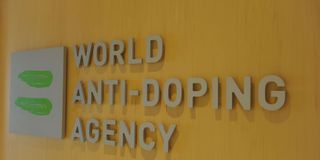
The World Anti-Doping Agency (Wada) logo.
The meeting comes in the wake of an increase in violation of anti-doping rules by Kenyan athletes, with over 30 athletes suspended from competing in the past one year for flouting these regulations.
The AIU is an independent body formed by World Athletics to combat doping in global athletics.
On Wednesday night, Ababu Namwamba, the Cabinet Secretary for Youth Affairs, Sports and the Arts, wrote to World Athletics President, Lord Sebastian Coe, assuring that the government has committed an annual amount of $5 million over the next five years towards the war against doping.
Kenya has currently been designated under ‘Category A’ by Wada, which denotes a country with the highest prevalence of doping.
Russia is currently facing a global sporting ban owing to State-sponsored doping that was unearthed in 2016 by whistleblower Dr Grigory Rodchenkov, a former head of the Russian national anti-doping laboratory.
State-sponsored doping
Dr Rodchenkov disclosed that Moscow ran a State-sponsored doping programme and had concealed a deep web of deception and fraud.
His revelations led to the banning of Russia from the 2018 Winter Olympics with the country currently still banned from most global sporting events.
While Kenya’s situation isn’t as gross as the Russian one, the situation appears precarious ahead of tomorrow’s meeting in the principality.
In his letter to Lord Coe, Namwamba said Kenya had taken important measures in the fight against doping, including enacting the Anti-Doping Act of 2016 which established the Anti-Doping Agency of Kenya (Adak).
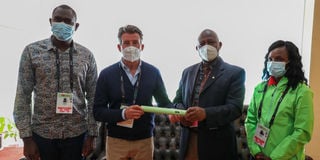
World Athletics President, Sebastian Coe (second left) holds a relays baton with Athletics Kenya President Jackson Tuwei (second right) as World Under-20 Championships ambassadors Milka Chemos and 800m world record holder David Rudisha look on in Nairobi on August 19, 2021.
Namwamba said fighting doping in athletics was a ‘matter of top strategic national interest’.
“This is a serious concern. That is why government is giving it its total undivided attention. We are treating it as a matter of top strategic national interest,” Namwamba said in a text message response to the Nation.
But according to the Sports CS, that Kenya had recorded rising cases of doping meant growing success in the fight against the vice, and that any country suspension or ban would be ‘extreme’.
“Suspending Kenya because of the actions of some greedy unethical individuals would be extreme, unwarranted and undeserved. The best approach is to target and deal decisively with the criminals and their syndicates, as we are doing. We must work together to eradicate doping and cheating from athletics and sports in general,” Namwamba said.
Kenya, he said, was working with all bodies managing the sport, as he insisted that the country had made important strides to combat the vice.
“The government is taking firm measures to protect and uphold the integrity of athletics and sports in general. We are working in unison with Kenyan and world agencies. The position of the Republic of Kenya is zero tolerance to doping,” Namwamba said.
Protect pedigree
In all, Namwamba insists that Kenya was on top of the situation, and was working to jealously protect the nation’s hard-earned pedigree as an athletics giant.
“A few unethical criminal elements are soiling Kenya’s hard-earned premium pedigree as a top athletics nation that prides herself on competing and winning clean. We won’t allow them. We must defeat doping and its perpetrators,” Namwamba said.
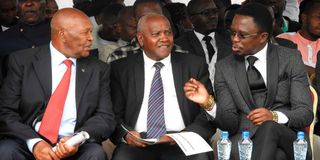
Veteran athlete Kipchoge Keino (left), Athletics Kenya Vice President Paul Mutwii and Sports Cabinet Secretary Ababu Namwamba during the burial ceremony for Wilson Kiprugut Chumo at Kipsigis Girls High School in Kericho County on November 12, 2022.
In the letter seen by Daily Nation, Namwamba further said the coronavirus pandemic that struck between 2020 and last year had adversely affected athletes, some of whom were tempted to use unscrupulous ways to gain unfair advantage once the global sporting lockdown was lifted.
He said Adak needed more funding to step up the war against doping, hence the government’s decision to vote $5 million annually towards this battle.
“Adak requires better funding to increase the number of tests and to also enhance investigations,” Namwamba’s letter read.
“On the other hand, AK (Athletics Kenya) needs increased funding to, inter alia, step up anti-doping education, support emerging talents professionally and create a safer environment for the sport through licensing and registration of various processes.
“Consequently, the Government of the Republic of Kenya wishes to inform World Athletics of its commitment to set aside an increased annual amount of $5 million for the next five years.
“During this period, the government shall regularly review its anti-doping operations and also re-tool Adak which, having been established in 2016, certainly needs re-evaluation in line with international best practice,” the CS said.
While there are fears that Kenya could face a ban like Russia, many feel that Kenya has done enough to curb the vice by meeting most of Wada requirements.
The focus at Friday’s meeting in Monaco was also expected to seek the Kenyan government’s commitment to increased funding to fight doping, hence Namwamba’s move to offer assurance.
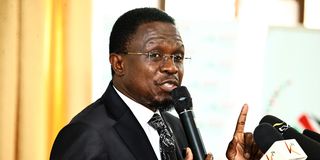
Sports Cabinet Secretary Ababu Namwamba. The relevant authorities must go back to the drawing board and quickly establish where the rain started beating us.
The doping scourge continues to rear its ugly head despite the heightened anti-doping campaigns by Wada, AIU, Adak and Athletics Kenya, with Kenya leading in the number of international athletes tested worldwide.
More cases
What is more disturbing is that the number of elite athletes, who have been flagged down for violating various anti-doping rules, has been on the surge with most coming during the most prestigious sporting competitions.
The latest cases happened a month ago when AIU provisionally suspended Ibrahim Mukunga Wachira and Kenneth Kiprop Renju for the use of banned substances on October 18.
Mukunga, who at one time in 2017 won a half marathon race in Estonia in socks, has been suspended for the use of prohibited Norandrosterone while the national 10,000m champion Renju got nabbed for the use of Methasterone.
Mukunga and Renju’s ban comes only four days after the 2021 Boston Marathon champion Diana Kipyokei and her compatriot Betty Wilson Lempus were suspended for using banned substances.
Kipyokei and Lempus’ suspension came only three days after Kenyan marathon runners Mark Kangogo and Philemon Kacheran were banned for doping.
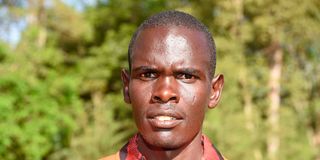
Kenyan marathoner Philemon Kacheran during a press conference at Kenmosa Resort in Eldoret town, Uasin Gishu County on May 21, 2022. He was banned for three years on Monday for testing positive for excess levels of testosterone
Kacheran, who has been banned for three years, was hounded out from Team Kenya that was already in Birmingham for the Commonwealth Games held on July 28 to August 8 in the British second capital city.
Kacheran’s ban came six days after compatriot Lawrence Cherono, the 2019 Chicago and Boston marathon champion, was prevented from competing in the World Athletics Championships in Oregon, also for a doping offence.
Besides Kacheran, three other Kenyans were banned from taking part at the Commonwealth Games owing to various anti-doping rules violations: female marathoners Stella Barsosio and Purity Changwony and 1,500m runner Kumari Taki.
In 2018, World Athletics placed Kenya among four countries in ‘Category A’ of countries where doping was prevalent.
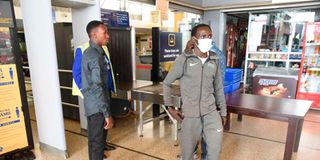
Kenya’s marathon team captain Lawrence Cherono at the Eldoret International Airport on July 13, 2022.
Others were Ethiopia, Belarus and Ukraine.
Athletes from these federations selected to compete in major events will have to undergo at least three out-of-competition doping tests in the 10 months before a World Athletics Championships or Olympic Games.
One of the tests must be of blood and the tests should be done two weeks apart.
Kenya escaped going the Russian way and was able to compete at the 2016 Rio Olympic Games after President Uhuru Kenyatta signed into law the 2016 Anti-Doping Act, which saw the establishment of Adak.
Since the AIU commenced operations in 2017 and established a Wada-approved testing laboratory in Nairobi in September 2018, the number of Kenyan cases at an international level has increased significantly and remains nearly 40 per cent of all international cases.
According to latest statistics, the number of samples collected from Kenyan athletes by AIU in 2021 relative to other athletes is 18 per cent of the total.
A total of 1,319 Kenyan athletes were tested compared to Ethiopia’s 931 (13 per cent) and USA’s 584 (eight per cent).
Adak and Athletics Kenya have also been working closely with AIU to uncover doping in Kenya, which is different from Russia that worked against AIU’s efforts.
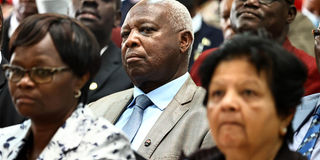
Athletics Kenya President Retired Lieutenant General Jack Tuwei follows proceedings during the meeting between sports federations and the Ministry of Sports at Kasarani on November 16, 2022.
In a report in September 2018, Wada’s Intelligence and Investigations Department described doping cases in Kenya as serious, ranking the country among the top three nations with high cases of doping in the world.
However, Wada’s director of intelligence and investigation Gunter Younger disclosed that doping practices of Kenyan athletes were unsophisticated, opportunistic, and uncoordinated.
Younger explained that in its Kenya Project task force report that incorporated Adak and the AIU that most Kenyan elite athletes abuse the more complex and sophisticated Erythropoietin (Epo).
In September 2020, AIU started to conduct a number of group testing for road runners across the country leading to more cheats being nabbed as Adak increased their numbers in their testing pool.
“Kenya has more athletes and that explains why the numbers in doping cases are high. It’s also a clear indication that systems put in place by Wada, Adak, AIU and Athletics Kenya are working unlike before,” said Athletics Kenya President, Lt. Gen. (Rtd) Jack Tuwei.
“Actually, that is a victory to us since in the long run, we shall remain clean athletes.”
Head of the AIU Brett Clothier and Adak’s legal chief Bildad Rogoncho and Athletics Kenya executive committee member Barnabas Korir noted on NTV’s SportOn! Show on October 24, 2022, that they desperately need more funding to fulfil their roles effectively.
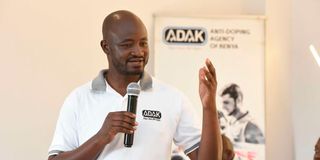
War on doping: Martin Yauma, from Anti-Doping Agency of Kenya-Head of Education and Research speaks during the Anti-Doping Agency of Kenya/Athletics Kenya awareness creation seminar for World Championships probables held at EKA Hotel in Eldoret town, Uasin Gishu County on November 15, 2022 ahead of the event to be held in Budapest, Hungary next year.
Mr Rogoncho said that Adak currently tests approximately 1,500 samples annually but require government support to increase the number to 3,000 which would, in turn, trigger the accreditation of a Kenyan testing laboratory by Wada.
AK and Adak will require not less than $5 million (Sh615 million) for their activities with Adak taking $3 million (Sh369 million) from the allocation.
AIU receives $8 million (Sh984 million) annually from World Athletics and from next year it will receive an additional $2.5 million (Sh307 million) from the road running industry to ensure that the top 150 ranked men and women in the world on the road are tested.






